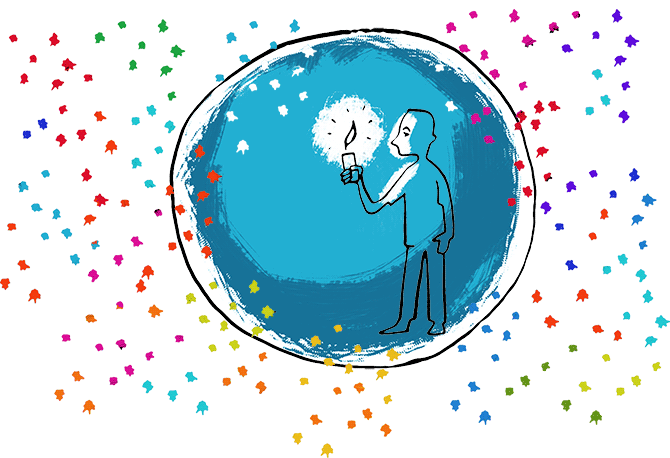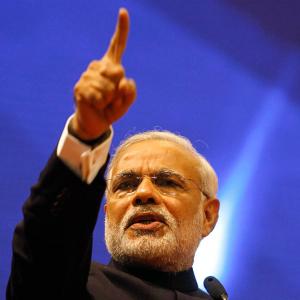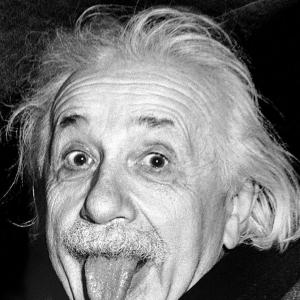All successful persons exhibit strong personal power, whether in the material world or in the spiritual one, leading to amazing results and shining in all fields of life, says Gian Kumar.
Illustration: Dominic Xavier/Rediff.com

Are you aware of your personal power?
Each one of us is unique.
We have something special in all of us.
It is our own uniqueness, which just cannot be duplicated or compared with anyone else.
Personal power is that state of mind, wherein our strength of uniqueness reveals the presence of our individuality.
It is the ability to think, feel and reason with our own intensity of aware energy, which gives us the confidence to act in any situation with poise and grace.
This ability gives us the power to be in charge of our thoughts and emotions rather than follow or allow others to influence or dictate to us.
It is the sum total of our intellect, spirit and will all as one.
Personal power has a direct link to our state of consciousness.
As we evolve and become conscious of the inside and outside and take charge, our inner power awakens and reaches a higher state of consciousness.
To be spiritually conscious means that we are aware of our own self and take responsibility for all our actions, not giving any excuses or providing explanations.
Those with a lower state of consciousness normally react negatively to any circumstance, criticise and blame others and are not aware of the nature of their own reality.
* * *
The role of our conscious mind is basically to provide that ability for correct decision making.
On the other hand, the subconscious mind running on auto-mode takes forward both the mind and the body involuntarily in an effortless manner.
It is said that over 90 per cent of the mind functions in an unconscious mode, simply because it is faster and the memory is already filled with past awareness to act on its own.
In fact, this unconscious portion is a byproduct of the conscious mind and is considered to be more of an illusion.
Since it relies more upon past information from its memory, it projects that into the future while missing the essence of the present moment.
* * *
The moment the mind is awake, it becomes aware and conscious of all that is happening around and also goes further by pre-empting what is about to happen.
The conscious mind manages the subjective part where all major decisions are made.
The subconscious mind is merely a doer on its own and carries out on various ‘errands’, depending more upon the behaviour of the individual overly concerned with its self-interest in all that it chooses and decides.
Most reflex actions and conditioned reflex actions of the mind do not require consciousness to play their part.
This is the reason why the subconscious mind is probably 10 times faster when compared to the conscious mind, since the former does not require any duration to be conscious about anything.
The conscious part determines what the mind freshly experiences and the subconscious part does the rest of the routine work, taking care of the numerous other chores and errands.
If a mind makes any mistake in ignorance, it is mainly because of not being conscious of the same.
A mind can also become conscious and know things just by seeing, because a seer sees in awareness and not necessarily by thinking.
It is thought which makes the mind deviate from its totality towards separating any object or situation into this or that in order to choose in its self-interest for the sake of self-preservation.
This is how the cognitive mind has been designed to think, choose and discern from its sensory perception exclusively for its ‘me and mine’.
Therefore, the three levels of the mind, though scientifically not approved, are widely accepted as a descriptive model to frame the nature of our psychic reality.
The subconscious consumes the largest part of the mind involving the memory and the intellect.
The conscious section is primarily restricted to its intensity of aware energy occupying a small portion.
The third level is the unconscious, which is the deep and unresolved part, simply because of its inaccessibility to connect easily with the conscious and subconscious thoughts.
* * *
The unconscious part of the mind is devoid of conscious awareness and we have no idea of what data is stored in it.
The moment the mind is awake and aware, it becomes conscious and, subsequently, the subconscious takes over.
Therefore, modern psychology is primarily concerned with only two sections of the mind.
First, a conscious mind that is free from all bindings and creates new ideas.
The second is the subconscious or the supercomputer, which is charged by memory with programmed information automatically reacting by releasing unconscious thoughts.
* * *
Meditation is all about how to make our mind more conscious, so as to be aware of all that we do in the present moment, rather than our acts being selfishly done subconsciously from the mind’s past exhausted awareness.
Results from the conscious mind are more significant and valuable than those from the subconscious mind.
It is the spontaneous primordial awareness of any present moment, which makes the mind aware and conscious.
And it is those subconscious thoughts, which later draw information from the memory and the intellect via thoughts to form its self-consciousness.
It is the conscious level, which ‘controls’ the mind providing the power to engineer it in accordance with its individual degree of awareness.
In totality, it is the mind’s capacity to remember, which makes us experience and realize who and what we are.
Consciousness, in fact, becomes the ‘rememberer’, drawing its energy from the memory bank and is the sum total of our past experiences.
It keeps on expanding and evolving, becoming further aware of what we are.
It reveals the degree and quality of awareness in order to transmute and transform within any individual mind.
* * *
Spiritually, there is no segregation between the conscious and the subconscious, since all that exists is one and not two.
The former is the unique nature of one’s reality and the latter an illusion created by the mind.
Since conscious thoughts occur purely under awareness, they reflect our inner power to determine the outcome of any situation.
When we become conscious of our own presence, apart from being alert and aware that we possess our own personal power, we do not remain a victim of any situation.
We thereafter respond to any situation to proact spontaneously with an inner strength of awareness rather than react emotionally by thinking.
It is these flashes of spontaneous awareness, which are basically devoid of thoughts for a short period that result in creativity and intuitiveness, which our thoughts later recall and put to good use.
This is the fundamental essential quality of all successful persons; they exhibit strong personal power, whether in the material world or in the spiritual one, leading to amazing results and shining in all fields of life.
* * *
The subconscious portion containing the unconscious thoughts of our mind is simply incapable of going inwards to observe and become aware of our own mind, which is the crux of spirituality.
How to awaken our consciousness, so that we are able to observe our own mind and its thoughts is the aim of spirituality.
In a lower state of consciousness, due to lack of present awareness, we succumb to circumstances, unconsciously allowing them to rule over us.
We unnecessarily become a victim of fate or destiny.
Emotion and desires cloud our mind and dominate us unconsciously; we are suffused with envy, jealousy, contempt and frustration, boosting a negative self, where we lose all control.
We may be conscious of our negative emotions but remain unconscious of the damage they are doing.
Our energies get depleted due to a false sense of ego and our attitude becomes pessimistic and unresponsive to all that is happening around us.
* * *
We can activate and enhance our own personal power, not emotionally, but by going consciously inwards to know the self, observe our own mind and not allow it to go astray.
The mind is present in all of us and it is entirely up to us to awaken it, if lying dormant.
Many people manage to scale unattainable heights in their lifetime; others struggle unconsciously with daily problems just to survive.
Are the former born with super-intellect and intelligence? No!
It is the personal power in their mind, body and spirit, which makes them consciously undertake the most difficult tasks in life and finish them successfully.
* * *
Personal power is that inner power, which is directly proportionate to everything that we perceive and become conscious of.
It is that determinant of the level of our consciousness, which further determines all our subjective experiences.
It ascertains the degree of our awareness, which our mind reveals.
The outside world exists, as it is; we just cannot change that, for all experiences are but reflections generated by our own mind.
There is really nothing for us to point out, compare, blame or judge in order to suit our own convenience.
What do successful people have in common?
It is the ability to draw limitless energy beyond the normal confines of the cognitive mind.
They can also tap internally to enhance their own infinite personal power -- creative as well as spiritual.
We should awaken and take charge of our consciousness and not allow it to drift.
We should empower ourselves spiritually to perceive any negative situation through silent observation.
We should pro-act with aware energy and not emotionally react, becoming conscious and awake in any present moment.
We should surrender our ego and accept the situation as it is, and realign our thoughts to act accordingly.
* * *
Let us now take the case of will power.
A person’s will is considered to be his capability in making a conscious choice.
It is related to desire; the more the desire, the stronger is the force behind that choice.
If we do not desire something strongly, the less will be our power towards attaining that goal.
That is why we say ‘where there is a will, there is a way’.
It is more of self-discipline in self-control, an instinct, which comes from both the mind and the body as a reaction to a certain mental action.
Will power is utilised more for external reasons rather than transcending that inner self and reaching a higher realm.
During the initial stages, personal power is limited to intellectuality and will power, both responsible for creating our personality.
Gradually, as we become aware and conscious of our own mind and our own inner self from its experiences, psychic energies merge both our intellectual and will power into an inner spiritual power.
This process eventually culminates in forming the essence of our uniqueness, responsible for possessing a distinct individuality.
Therefore, our personality reveals our external image to the world and individuality unveils that uniqueness: the aura of that inner personal power that we possess within.
Allow me to elaborate further. At one end, we have the ego power in the form of our personality and, at the other, there is the personal power of the soul.
The former reacts to any stimulus after emotionally thinking in self-interest and the latter proacts consciously without thinking in spontaneity through observance.
In the former, the ego separates the mind’s energy into a duality and, in the latter, the energy remains absolute in creative intelligence, until thoughts take over.
The total sum of our personal power eventually forms our individuality, compared to reactive emotions through calculative thoughts that form our ‘presumed’ personality.
In the former, our individuality exudes creativity, openness and sensitivity, responding spontaneously to any stimuli.
In the latter, our thoughts manipulate us in order to derive the best results by thinking only in self-interest.
Both are required in their own way for the sake of existing in our material and spiritual fields.
* * *
Individuality is a reflection of our consciousness and personality that of our ego.
Individuality, through its spiritual power, liberates us from the clutches of our self-attachments, whereas personality drags us towards materialism.
Individuality, or our personal power, is more of a metamorphosis of our personality. It reveals itself when we rebel against all that has been imposed upon us through blind beliefs in rituals and traditions.
When we stop imitating others and experience every action with our own intuitiveness, the process revitalizes our consciousness and helps in changing its direction towards our individuality, our real being.
This does not mean that we are against any society, community or organization; our individuality is simply the source of our creativity, flowing out with freshness and freedom.
* * *
We are not only body and mind, but also the ‘experiencer’, who reflects upon life either through an egoistic personality or through the spiritual mind, thereby experiencing the self through individuality, that is, intuitively, through personal power.
The inner power is the flame of spiritual awareness with our unique personal power, which subsumes ego, thereby indulging in, and experiencing, life through our consciousness.
The awareness within us makes us sensitive towards others.
Personal power, in fact, is nothing but the degree of our individual awareness, which increases our conscious quotient taking us away from our egoistic self towards the totality.
We monitor events and become conscious after witnessing and then controlling our mind through thoughts and words.
We learn how to navigate through our thoughts, emotions and beliefs within the realm of our consciousness.
This is that unique power, which gives us the insight that the outside world is not separate, but purely a reflection of our inner consciousness.
The world exists as it is; we can neither change it nor do we have any control over it.
However, we have limitless power to change our inner self and perceive the outer with a positive view, so long as we are conscious about our actions.
In other words, personal power is a reflection of who we are and how we interpret the outside world.
Therefore, we need to raise our consciousness to higher levels, so that we may have enough intrinsic power to promote an outside world in accordance with our expectations and aspirations.
This is the key to awakening; we should increase our personal power, so that we are not ignorant, either from the inside or towards the outside world, because both are inherent and intrinsic to each other.
Excerpted from Spiritual Power: Being And Becoming by Gian Kumar, with the kind permission of the publishers, Hay House.









